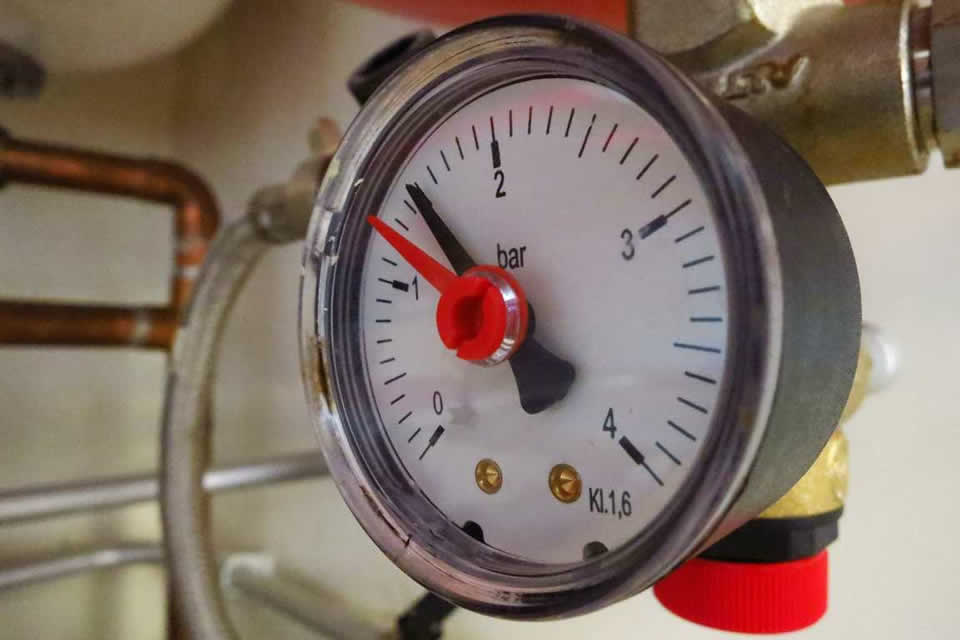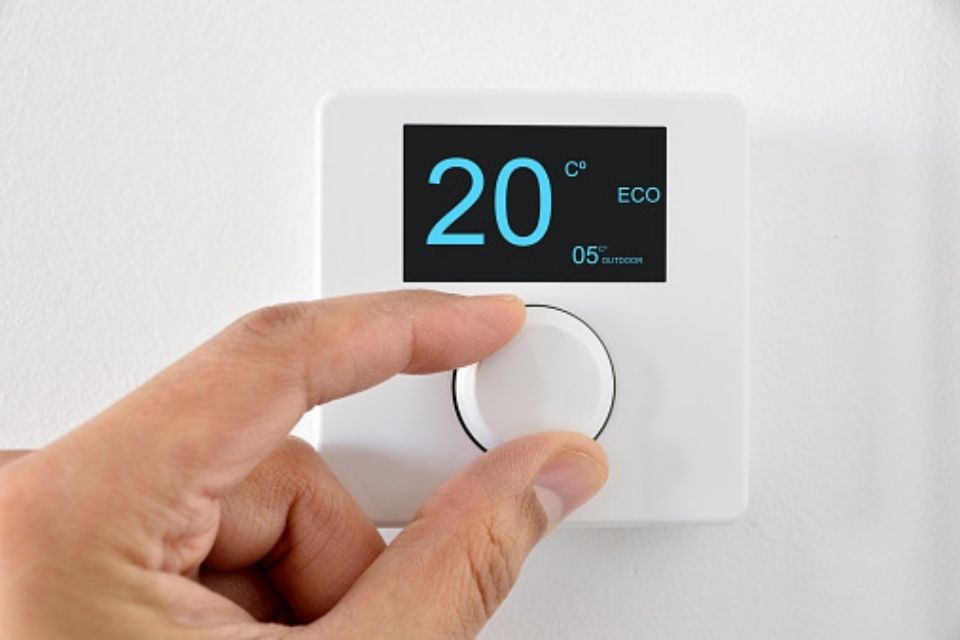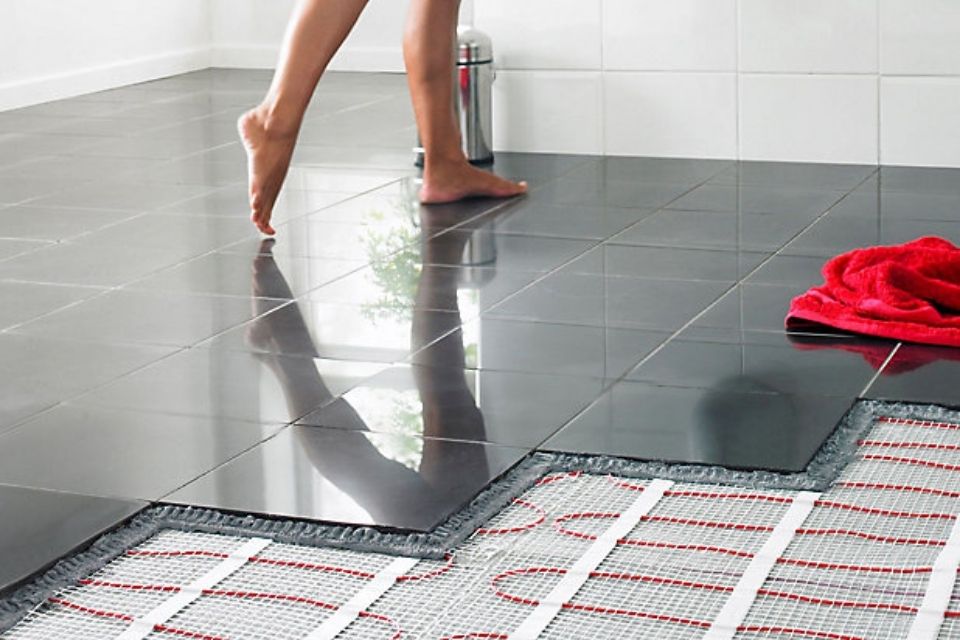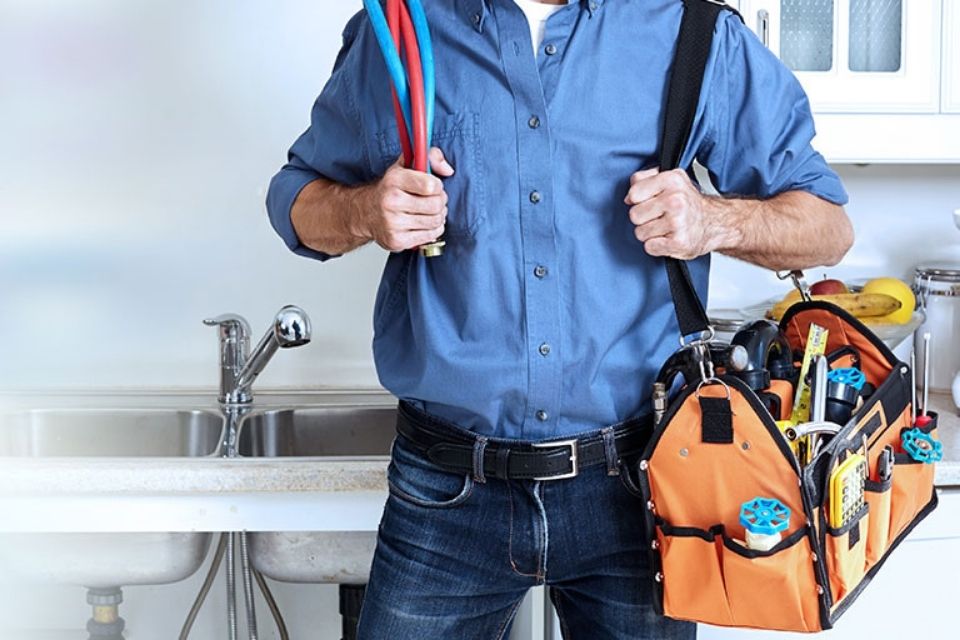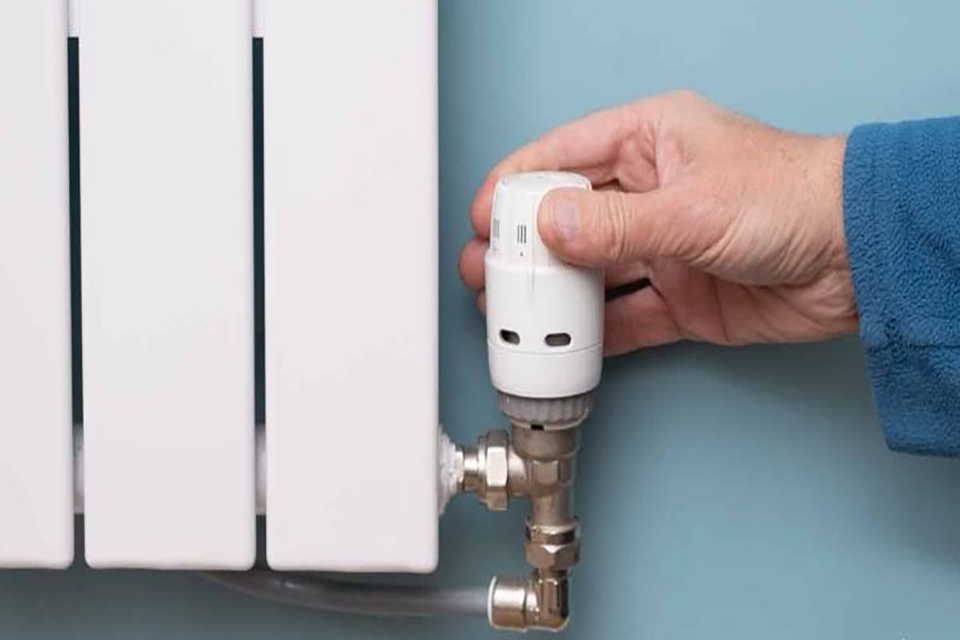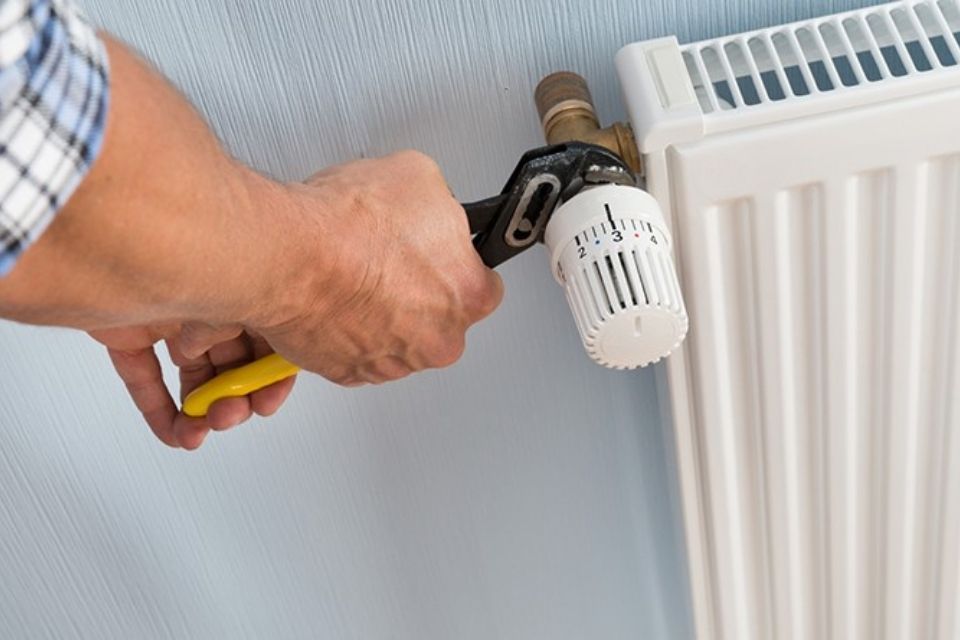What is Boiler Pressure?
Simply put, boiler pressure is the balance between water and air within a boiler’s system, i.e., the pipes and components. It could also be described as the pressure of hot water running in a sealed central heating system.
What’s more, for a boiler to efficiently pump water and heat your radiator, the pressure needs to be stable and well balanced; not too high and not too low. More so, it is normal for the pressure on your boiler system to increase or decrease from time to time, but extreme shifts are problematic.
In fact, a valve on the heating system called the expansion valve helps to control pressure within the boiler by ensuring a balance between water and air. The resultant low air to water ratio leads to an increase in pressure; the same goes for a high air to water ratio.
Additionally, over pressurised boilers could cause water leakage from the pressure relief valve, which could result in low pressure or permanent damage to your central heating system.
More so, when the pressure in your boiler is too low, it is usually as a result of water leakage or radiator bleeding. This, most times, does not pose a high risk to the entire boiler; however, it might affect the efficiency of the system to heat your home efficiently and pump water. On top of this, it will also affect energy savings and cost more on electricity bills.
Signs Your Boiler Pressure is Dropping
As mentioned above, having a low-pressure boiler, or no pressure in boiler is bad for both your heating system and your budget. So how can you tell when your boiler’s pressure is running low?
Check The Pressure Gauge
Most boilers have a pressure gauge located on the control panel. The pressure is represented by a circular disk that has a range of measurements from 1-4 bar (1-5 in a few boilers). These marks are divided between the green zone and the red zone. The green zone is the normal operating standard for the boiler pressure, while the red zone indicates the maximum safe working pressure of the heating system.
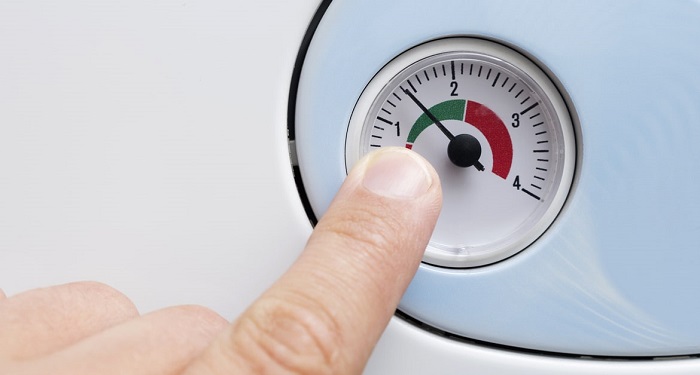
Additionally, the green zone is usually between 1.0 and 1.5(sometimes 2.0) bar on the pressure gauge, and the red zone goes from 2.5 to 4.0 bar. Furthermore, if the needle on your pressure gauge has fallen below the green zone, this is a sign that the boiler pressure is too low.
Radiator Malfunction
Another sign that a boiler pressure too low is the degree of functionality displayed by the radiators in your home if you have any. If the radiators are not heating up as well as they should, then it most likely means the boiler pressure is dropping. This can be confirmed by checking the pressure gauge.
Why Does My Boiler Keep Losing Pressure?
Several things can be the cause why your boiler keeps losing pressure; this is in addition to the instability of air pressure in your boiler. Whether it’s a normal boiler or combi boiler losing pressure, some of these include leaky pipes, a malfunction in the expansion valve, or air in the heating system.
Here are some stand out reasons for boiler losing pressure or having low water pressure.
Leakage In The Pipework
First of all, there may be a leakage in the heating system's pipework itself. In this case, water stains on your ceiling could be an indication, in addition to a damp floor. Also, if you notice that water is dripping from the system's pipe, or if there are holes in the radiator, this may mean that there is a leakage in the central heating system. To make things worse, rusty or corroded radiators or pipes may cause leaks and lead to a drop in the system's pressure.
Damaged Expansion Valve
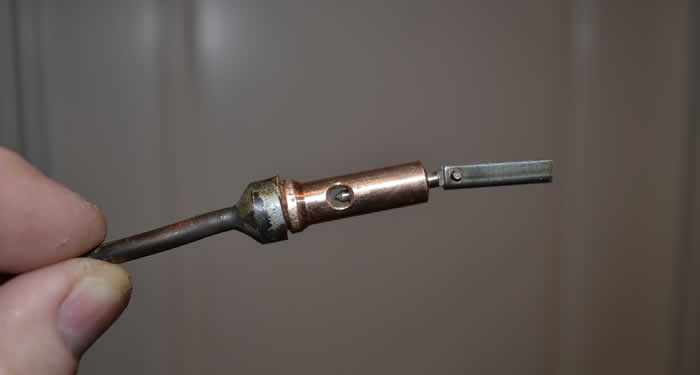
A faulty expansion vessel/valve, may also be the cause of a boiler losing pressure when cold. When cold water heats up inside a boiler or any heating system at all, the molecules move around so rapidly that they expand. In a pressurised system, the expansion vessel, which contains about a ½ bar of pressurised air in a rubber diaphragm, allows the water to heat up and expand without letting air into the heating system and further causing damage.
In a nutshell, the expansion valve is there to accommodate the expansion caused by the heated water.
Therefore, if the expansion valve is faulty, the increase would likely not be controlled, causing the heated water to spill out of the pressure relief valve. If water isn't being released from the relief valve, it is advisable to check the Schrader valve, which is located on the expansion vessel.
It’s also worth noting that the Schrader valve is similar to an air valve on a bicycle or car tire in both function and appearance. By unscrewing the Schrader valve's plastic cover, you will be able to press the pin found in the valve briefly. And if water rushes out instead of air, this means that the expansion valve is faulty. What’s more, the diaphragm within the vessel is most likely damaged, and the vessel would need to be changed.
The Air In The Heating System
Another possible reason that will make the boiler pressure low is the presence of air in the heating system. Checking for air in your boiler is quite simple and can be done independently without having to call a technician or heating engineer.
Also, if your boiler system has some radiators, the first thing to do is to bleed them. This can be done by locating the radiator bleed valve and carefully turning it anti-clockwise until water starts to spill out. Doing this will allow trapped air to be released and let hot water into the cold fins. Sometimes, bleeding the radiators does not work; in this case, it is advised to call an expert.
Leakage In The Relief Valve
Last but not least, the boiler's pressure relief valve could also be a prospective problem area, causing pressure drops in your heating system. The water leakage could be caused by dirt or debris stuck in the valve. In this case, the valve may need to be cleaned out or replaced by a heating engineer.
What Pressure Should My Boiler Be?
For efficient circulation of water around the house, your boiler must have an appropriate amount of pressure. Most boiler heating systems these days are closed systems which simply means that they don't have open vents to let out the expanded water molecules while they heat up and cool off.
These boilers instead are sealed and pressurised to accommodate these changes in temperature. Therefore, the pressure is quite necessary for the heating system to function.
In general, a pressure reading between 1 and 2 bars on the pressure gauge is a safe range on most systems. Every system is unique, so it is advisable to read and follow your boiler's manual or ask the technician who installed the system. And to check if the boiler pressure is within the ideal range, also check the pressure gauge.
If the direction of the needle is within the standard range indicated in the manual, then it is safe; if not, then it would be necessary to check the source of the imbalance.
However, some boilers have either LCD pressure gauge screens or dials with two needles instead of one (one black and the other red). The black needle indicates the actual pressure, while the red needle serves as a marker.
The LCD screens usually display water pressure while the double-needle dials point both needles in the same direction when the pressure is not within critical zones.
Additionally, most pressure gauges go from 1 to 4 bar; a few extend to 5 bars. The pressure is then considered high when the needle is pointed at a number that is in the critical zones. Critical zones in most boilers are below 1 bar and greater than 2 bars. This is usually between 3 and 4 bar on most boilers.
How to Re-Pressurise a Boiler
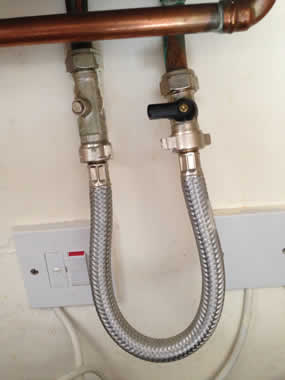
If you notice that hot water isn't rushing from your taps as usual or your radiators aren't heating up as they should, there is a possibility that your boiler needs more pressure. If this is the case, you would probably need to re-pressurise the system. Many boiler owners prefer to re-pressurise their boilers on their own.
If you are feeling confident about doing this on your own, it is advisable to read through the boiler manual to ensure the process is straightforward enough to be carried out personally. If it's not, then it is advisable to call a heating engineer. Re-pressurising your boiler allows more water to enter the heating system from the main supply.
To repressurise your boiler, you need to:
- Switch off your boiler and allow it to cool down completely.
- Check that most ends of the filling loop are appropriately attached. Underneath the boiler, there is a braided, flexible filling loop located between the cold feed and the return feed. When you find it, check that both sides are carefully attached. This step is crucial because the pressure drop may be due to a leak in one of the valves.
- Open both valves so that cold water can flow into the system while watching for any changes on the pressure gauge. When the pressure gauge reaches 1.5 bar, close both valves.
- Remove the filling loop (if it isn’t built-in), then turn the boiler back on.
- Check the pressure gauge to ensure that the issue has been fixed. Depending on the model of the boiler, the filling loop may either be built-in or external. External loops would need to be attached and removed manually during and after the re-pressurising process. If you happen to over-pressurise the system by mistake, you can easily bleed out the radiators to let the excess air out and bring the pressure back down. Be sure to keep an eye on the pressure gauge for the next few days to see if the pressure levels stay constant.
What Can Happen if I Don’t Fix My Boiler Losing Pressure?
Today's boilers require pressure to effectively provide hot water for domestic use, and warm up the home. Usually, low boiler pressure isn't so harmful to your boiler's functioning lifespan, but it could be very inconvenient. Hence why ignoring your boiler's low-pressure issue could lead to several inconveniencing scenarios - one of these being the banging noises that most heating systems tend to make under this condition.
Furthermore, the sudden drop in pressure and water circulation will often create a banging and clanging noise in the pipework. Loss of radiator function would probably follow since the radiators need stable pressure to be able to create heat and the most annoying effect of this malfunction is having to endure the cold air in the house, especially in the winter. Even more annoying would be the use of cold water to do dishes or even shower.
If the low-pressure issue is not fixed soon enough, most radiators will trip off or turn themselves off. Low pressure on a boiler is not known to cause danger or hazards, but it is advisable to get it fixed to prolong the lifespan of your boiler.
When to Get a New Boiler
It is essential to know when a boiler needs replacing, especially if your boiler pressure keeps dropping or you keep having to repressurise it.
Efficiency Ratings
Another indication would be your electricity bills. If you notice a high rise in your electricity bills without any apparent explanation, your boiler may be responsible for this. The term 'efficiency ratings' may not be very familiar with most people, but it is quite essential when purchasing a boiler. In simple terms, a less efficient boiler takes up more current, therefore hiking up the price of your electricity bills.
A more efficient boiler does the opposite. Most modern boilers run at a 90% efficiency rate, which is good, while some of the older models run at 70%. So, if your boiler runs at a low-efficiency rate, it may be time to consider getting a new one.
Change In The Sound
Having noisy radiators could also be a good reason to get a new boiler. It is normal for a boiler to have a low humming sound or several other types of sounds. Still, if you notice that the sound of the boiler has changed to noisy, tapping, vibrating, or banging noises despite servicing and repairs, it would be advisable to look into investing in a new boiler.
Most times, tapping sounds indicate that the pipes have some sludge or debris build-up and may need to be changed. And for banging or vibrating sounds, it could mean there is a more significant fault within the boiler or heating system.
Changes In The Smell
Another serious indication that you need to replace your old boiler is if you begin to smell a sulfuric or eggy odour coming from your heating system, this means there is a gas leak. You should immediately turn the boiler off and call the emergency gas line. Also, contact a registered Gas Safe engineer. In most cases, the boiler may need to be replaced.
Frequent Repairs
When you find yourself frequently repairing or paying for the rehabilitation of a boiler, it is wise to consider getting a replacement. When considering the total repair costs per year compared to the cost of buying a new boiler, purchasing a new heating system would be wiser. What’s more, a well-functioning boiler should need servicing at most twice a year.
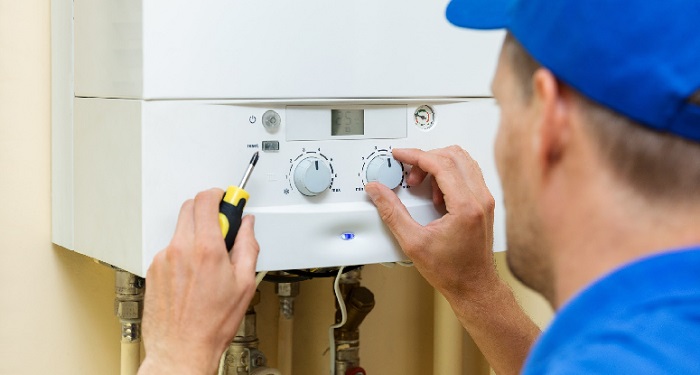
Boiler Lifespan
The average life expectancy of a boiler is about ten years. If your boiler is over ten years old, chances are it wouldn't be as efficient as it once was. Also, most insurance companies have a 10-15-year limit on boilers. If something goes wrong, they will not be obligated to cover the costs. Besides, a boiler of about 10 to 15 years most times drops its efficiency rate and could begin to consume more current than usual, some may even stop working altogether.
Spare Parts
If a section or a part on your boiler is permanently damaged, you may need to consider buying a new one as a whole. Though there are some spare boiler parts on some online shops, it could be challenging to find the model or type that you are looking for, especially if your boiler is an older model.
Heating Engineer Cost
In the case of a boiler malfunction, you may need to call a heating engineer, especially if it's a complicated problem. However, the amount a heating engineer charges is dependent on the task involved as well as the urgency, the time it would take to complete the repairs, and what parts need to be fixed are equally determinants. It is the engineer's job to diagnose the problem first before fixing it.
More so, the prices of hiring heating engineers also vary from country to country and from company to company. What’s more, with independent heating engineers, costs differ as well. It is imperative to use only certified and registered heating engineers, and they should be able to provide evidence of their certification if/when asked. This ensures accountability for any malfunction noticed immediately after repairs.
Additionally, in the UK, the average cost of hiring a heating engineer is £75- £105 per hour. To re-pressurise a boiler, the average cost of labour would range from £50- £100, including tipping charges and VAT. The fee may change if any extra materials are needed. Emergency call-out-charges are usually twice the regular prices per hour. On average, a heating engineer could charge from £120-£150 per hour for an emergency call-out job.
FAQs
Q: What should boiler pressure be when heating is on?
A: When the heat is switched on in your home, the ideal pressure gauge reading should be between 1.5 and 2 bars. Most boiler manufacturers recommend 1.3 bar, but it is better to refer to the instruction manual or call the customer care number on the manual for further explanation.
Q: How long does a boiler last?
A: This depends on the company that manufactures the boiler. If the owner ensures to get it serviced at least once a year, it should last 10-15 years on average.
Q: Who qualifies for a free boiler?
A: You can apply for a free boiler if:
- You live in a low-income household
- You are a landlord with low-income tenants
- Your existing boiler is more than five years old
- Your property has a gas supply
- You are currently receiving a combination of Income Support, universal tax credits, pension credits, working tax credits, income-related ESA, income-related JSA, and child tax credits grants from the government.
- You’re a private tenant with permission from your landlord
Q: What different types of boilers are available?
A: There are three major boiler types; the combi boiler, the system boiler, and the standard boiler. The combi boiler is the most modern and more frequently used among the three. As the name implies, it is a combination of a water heater and a central heating system.
What’s more, the system boiler requires an external tank to store hot water while the central boiler itself produces heat for the heating system. In contrast, the standard boiler is more of an older model and is suitable for homes that already have a separate central heating system. This type of boiler needs different tanks for hot water and cold water.
Q: How do I know if I’m getting a good deal on my boiler?
A: It's better to purchase one from a company that has the 'Trusted Traders' badge. Or ask a technician or engineer that is experienced, trustworthy, and certified.
Sources
- https://www.boilergrants.org.uk/
- https://www.hometree.co.uk/energy-advice/boilers/is-boiler-pressure-too-high.html
- https://www.boilerguide.co.uk/articles/long-boiler-last
- https://www.plumbcare.com/blog/2017/07/7-frequently-asked-questions-about-boilers
- https://www.bestheating.com/info/what-should-the-boiler-pressure-be-when-the-heating-is-on/
- https://www.swyftenergy.ie/blog/9-signs-you-need-a-new-boiler

